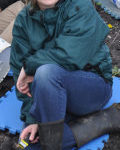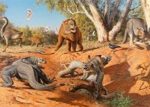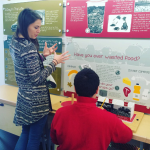climate change
Web-based tool will help government realistically plan for climate change
Jun. 5, 2017—Read the Research News @ Vanderbilt story here. Life beside the Mississippi River always came with some uncertainty about the safety of homes, crops and city streets. Residents looked at flood maps based on historical data and chose their sites, built their levies and bridge footings and kept a wary eye on the river stages....
Climate change took away ancient animals’ food supply; holds implications for today’s wildlife
Jun. 5, 2017—Read the Research News @ Vanderbilt story here. During the last Ice Age, Australia, Tasmania and New Guinea formed a single landmass. It was a strange and often hostile place populated by a bizarre cast of giant animals – massive kangaroos and others claimed in a global mass extinction 30,000 years ago. Researchers argue what...
Expert: Private industry, better messaging can help overcome damage from Paris withdrawal
Jun. 5, 2017—Read the Research News @ Vanderbilt story here. President Donald Trump’s announcement on Thursday that the U.S. will withdraw from the Paris Climate Agreement phases out U.S. commitments to achieve carbon reduction targets and make financial contributions to slow climate change. It was a move environmentalists found disappointing, at best. But Vanderbilt University law and...
Climate Science Myth Busters Seminar
Apr. 10, 2017—Join the Department of Civil & Environmental Engineering April 12 at 3:10pm in Featheringill Hall 134 for a seminar by Dr. Jonathan Gilligan: Climate Science Myth Busters. There is a lot of misinformation out there regarding climate change. Dr. Jonathan Gilligan will present on the state of climate science and answer questions such as: Is...
Gilligan, Vandenbergh win Morrison Prize for climate change article
Feb. 21, 2017—Read the Vanderbilt News story here. Research examining the role that private governance can play in bypassing government gridlock on climate change has earned a pair of Vanderbilt University professors this year’s $10,000 Morrison Prize, which recognizes the most impactful sustainability-related legal academic article published in North America during the previous year. Michael P. Vandenbergh...
Climate change helped kill off super-sized Ice Age animals in Australia
Jan. 27, 2017—Read the Research News at Vanderbilt story here. During the last Ice Age, Australia, Tasmania and New Guinea formed a single landmass, called Sahul. It was a strange and often hostile place populated by a bizarre cast of giant animals. There were 500-pound kangaroos, marsupial tapirs the size of horses and wombat-like creatures the size...
Mobile Lab Ambassador Application Open
Nov. 29, 2016—Do you enjoy teaching others about sustainability? Are you looking to get some experience in education? Do you want to work with Nashville students in the coolest Mobile Laboratory around? If you answered yes to any of these, we need you! We are looking for two paid VU student ambassadors for the Mobile Lab for...
Cave study designed to solve puzzle of prehistoric megadroughts in the western U.S.
Sep. 2, 2016—Jessica Oster, assistant professor of earth and environmental sciences at Vanderbilt University, is using cave deposits to reconstruct past climates. The paleoclimatologist is also setting up an educational program to involve undergraduate, graduate, and high school students in the analysis of samples, design of independent research projects, and managing and manipulating data sets. Read the full...
Eight Vanderbilt researchers named ‘Inspiring Women in STEM’
Aug. 17, 2015—Originally published by MyVU. Eight Vanderbilt professors are recipients of INSIGHT Into Diversity magazine’s 100 Inspiring Women in STEM Award. The award honors highly accomplished women working in science, technology, engineering or mathematics who have made a positive impact on the trajectories of other women thinking about or newly embarking on STEM careers. “For many...
Deciphering clues to prehistoric climate changes locked in cave deposits
May. 27, 2015—Watch the VU Inside on Jessica Oster here. Read the Vanderbilt News story here. When the conversation turns to the weather and the climate, most people’s thoughts naturally drift upward toward the clouds, but Jessica Oster’s sink down into the subterranean world of stalactites and stalagmites. That is because the assistant professor of earth and...







